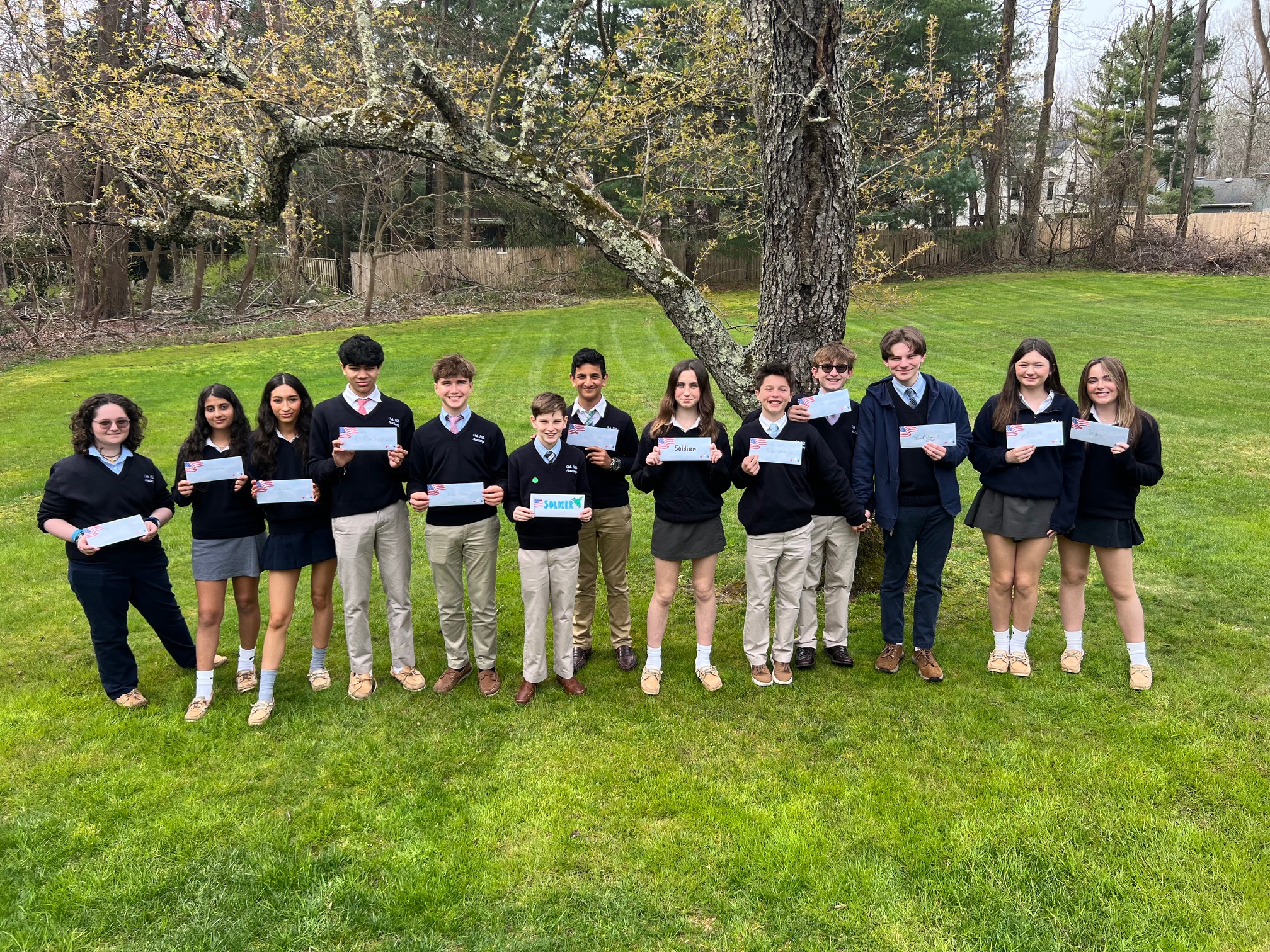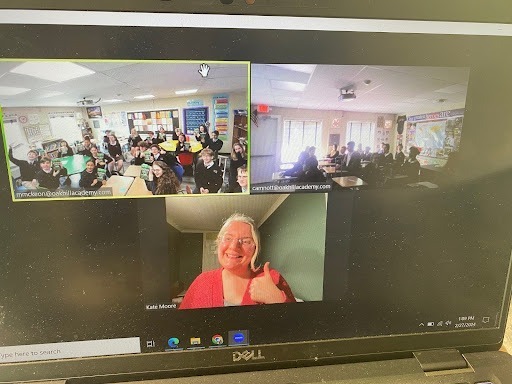My three young boys are home for school, and I am wondering why. Not why they are home, but why we are doing school.
Now, hear me out: I am blessed for sure. All three of my children – Isaac (11), Hayden (9), Eli (7) – are curious and eager. They are what teachers might call “easy” students (as long as you can stand Isaac’s preoccupation with being right all the time, Hayden’s random outbursts of song while reading, and Eli’s apparent need to stand up during math). Confession: they are more obsessed with keeping to their class schedule than I am (and I am a professional educator).
Ok, so my children are still thriving during our striving at home. But what is all this striving for, anyway? All the Zoom meetings, the paper shuffling, the arguments about screen time, the Google classrooms, the Seesaw journals, the online workshops? Just, why?
My boys are currently in elementary and middle school, but I am especially curious about their teenage years: what will be the purpose of their education then? Put differently, how should our teenage children
spend their days?

In this article, I will briefly discuss four answers to that question. My aim is not a comprehensive treatise on high school education, nor a dogmatic argument. Instead, this is a personal invitation to a conversation, supported by a few views to get us started. Our first two ideas come from Plato and
Aristotle, respectively, and the second two from the modern world.
Plato’s Socrates might say that the teenage years are for learning “human and civic virtue” (tis tes toiautes aretes, tes anthropines te kai politikes, Apology 20b). The question is, what is the virtue, or excellence, specific to a human being and a citizen? Socrates, in this part of a speech defending himself on his way of life, is relating a conversation that he had with a fellow Athenian parent, Callias, who spends more money than anyone on personal teachers for his two sons (Socrates has three sons of his own). Socrates assumes that, because Callias spends so much money on his boys’ education, he must know who can teach his sons to be the best humans and citizens possible. Callias’ answers to Socrates’ probing questions prove otherwise, and Socrates goes on to give hints at what might constitute such
“human and civic excellence” in the rest of his speech. It involves, inter alia, considering what justice is, and caring for your own mind (Greek, psyche) above reputation, money, and glory, and encouraging your fellow citizens to do the same (e.g., 29d-30b).
Socrates walks the walk when, after being condemned to death by the Athenians, he asks them to do the same for his sons after he dies that he did for them (i.e., the Athenians) while alive: “when my sons grow up, punish them, and pain them in the very same way I pained you, if they seem to you to care for money or anything else before virtue. And if they are reputed to be something when they are nothing, reproach them just as I did you: tell them that they do not care for the things they should, and that they
suppose they are something when they are worth nothing. And if you do these things, we will have been treated justly by you, both I myself and my sons” (41e). At the risk of oversimplification, Socratic education would likely include lots of reading, writing, and speaking about human virtues (such as wisdom, courage, and justice), alongside the building blocks of citizenship (such as collective decision making, rhetoric, and equality under law).
Aristotle, Plato’s star student, might say that the purpose of school is happiness (Greek, eudaimonia). Nearly impossible to translate (“happiness” will do), Aristotle’s eudaimonia is the ultimate condition at which all human activity aims. We might be tempted to think that we do things for pleasure, wealth, or honor, but we actually want those things because we believe they will make us happy. Think of it like this: if you keep asking ‘why?’, you will always end up at eudaimonia.
Here’s an example from my life. I teach Ancient Greek on the side. Why do I teach Ancient Greek on the side? Because I want a little extra cash. Why do I want a little extra cash? Because I want to buy good running shoes. Why do I want good running shoes? Because I want to run four days a week. Why do I want to run four days a week? Because I want to be healthy. Why do I want to be healthy? Because I want to be happy (i.e., experience eudaimonia). Why do I want to be happy? Because I want to be happy, period. I want to be happy because I want to be happy. Do you really have to ask, thank you very much?
Everything we do aims at eudaimonia (even school), but not everything causes it. What does? Aristotle argues, in Nicomachean Ethics, that eudaimonia is a state of the soul (Greek, psyche) arising from living
in accordance with all the virtues. These include justice, courage, and friendship. But the highest virtue for a human being is the virtue associated with the intellect: contemplation (Greek, theoria). In contemplation, which is a type of thinking, a human being is most fully alive and active (see e.g., 1177b 19 – 1179a 30). Contemplation includes both the power to exercise thinking and perceiving, and also the ability to rest in what is knowable. A day in the life of an Aristotelian teenager might include analyzing all the possible ultimate ends of human action (such as pleasure, honor, health, wealth, and happiness); reading, writing, and discussing human virtues (such as justice, courage, and friendship); considering who is a friend worth having; and simply enjoying the process of exercising their mind through learning (i.e., contemplation).
So much for Plato and Aristotle. We can summarily handle the third and fourth ideas. High schoolers might aim at learning a professional skill or a trade (that’s idea three). Or they might just want to get into college (and that’s our fourth idea). These are clear and distinct goals. Sometimes college is a means to the end of learning a professional skill; other times, college seems to be treated as an Aristotelian ultimate end in itself. Regardless, both purposes – skill or college – imply distinct curricula. That is, both
have specific consequences for how teenagers ought to be spending their days. And if we are committed to acting with the end in mind, then we will stick to the activities that help us achieve the goal.
Let’s just say, for example, that Isaac (remember, he’s 11) comes to me and says, “Dad, I want to learn how to fix high end espresso machines” (a good choice since there are no companies doing this in New Jersey; in this area they are all in NYC). Let’s further consider this a professional skill, according to our skill-versus-college dichotomy. If my view of high school education is limited to helping my son gain a professional skill, then I will limit his learning to those activities that gain him this skill and then
employment in that field. According to this logic, I probably will not send him to college (though, rest assured, he will read Plato and Aristotle). We will instead seek the best training programs from espresso machine manufacturers, and from the repair companies up in NYC. He will learn through their classes and apprenticeships.
Likewise, if Hayden (he’s 9) comes to me and says, “Dad, I really want a degree from The Ohio State University” (my alma mater), and I limit my view of the purpose of his high school education to getting into college, then we will tailor his daytime pursuits to the admissions standards of Ohio State. Modern high schools with either of these views in mind tend to signal their purpose with words in their names or brochures such as “vocational” (for professional skills) and “prep” (for college admissions).
So far I have briefly laid out four purposes of high school education: human and civic virtue; happiness; professional skills; college admissions. I have not passed judgment on them, aside from a sneaky
comment about Plato and Aristotle during my discussion of Isaac’s hypothetical career in espresso
machine maintenance. Nor do I wish to assess them here.
Instead, I would like to ask: are these purposes mutually exclusive? And if they are not mutually exclusive, but actually mutually compatible, then how do we build learning communities here in New Jersey where my Isaac, Hayden, and Eli can be educated in their joyful purpose as a happy human being, virtuous citizen, and skillful contributor to society all at once?
Once we tackle the question of high school’s purpose, I will invite you to another conversation of cosmic importance: how to end parent-child arguments about screen time, once and for all.




